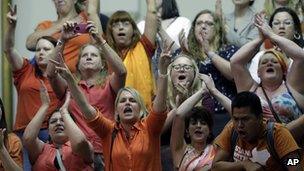New life for Texas abortion bill blocked by Wendy Davis
- Published
Senator Wendy Davis spoke for 10 hours
The governor of Texas has called a special legislative session in an attempt to pass an anti-abortion law blocked when a Democratic senator undertook a marathon delaying speech.
Republican Rick Perry ordered lawmakers to return on 1 July.
Senator Wendy Davis spoke for more than 10 hours on Tuesday, blocking Republicans from banning abortion after 20 weeks of pregnancy.
Republicans ran out of time when the legislative session ended at midnight.
The bill, opposed by many Democrats, who hold a minority in the legislature, would also require all pregnancy terminations to take place in specially equipped surgical centres, effectively closing most of the state's abortion clinics.
Decorum 'breakdown'

Perry, shown in New York City this month, holds very strong anti-abortion conservative politics
"Texans value life and want to protect women and the unborn," Mr Perry said in a statement, external on Wednesday.
"We will not allow the breakdown of decorum and decency to prevent us from doing what the people of this state hired us to do."
Mr Perry said the special session would take up three pieces of legislation, including the abortion bill.
During her extended delaying speech on Tuesday, which is known in US political parlance as a filibuster, Sen Davis read testimony and messages from women and others opposing the legislation as she remained standing without any breaks.
Sen Davis was picked to lead the filibuster because she had her first child as a teenager and went on to graduate from Harvard Law School. She said the bill would lead to the closure of Planned Parenthood clinics such as the one at which she received care.
"I was a poor, uninsured woman, whose only care was provided through that facility. It was my medical home," said Sen Davis, 50.
Republican Texas Lt Governor David Dewhurst, who is Senate president, eventually suspended the filibuster after ruling that she had gone off topic. Democrats appealed, sparking a debate over parliamentary rules.
State restrictions
As the clock ticked to midnight, Republicans rushed to hold a vote on the bill, amid jeers from pro-abortion rights protesters in the public gallery.

Abortion rights supporters cheered and chanted in the public gallery
But amid the disruption, Lt Gov Dewhurst said he had been unable to sign the bill within the deadline following a 19-10 vote. He blamed an "unruly mob" in the gallery.
Supporters of the bill say the measures will improve safety standards. It requires doctors who perform abortions to have admitting privileges at a nearby hospital.
Critics say only five of Texas' 42 abortion clinics will remain in operation if the law passes, forcing women to travel hundreds of miles or resort to dangerous methods to obtain the procedure.
The US Supreme Court legalised abortion nationwide in 1973, but about a dozen conservative states have enacted laws in recent years that seek to limit the procedure.
In March, North Dakota banned abortions once a foetal heartbeat is detected - as early as six weeks - in the most restrictive law of its kind in the US.
- Published26 June 2013
- Published7 March 2013
- Published19 June 2013
- Published14 May 2013